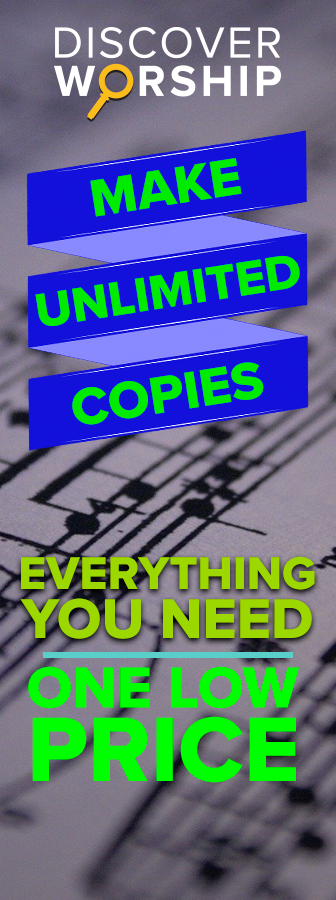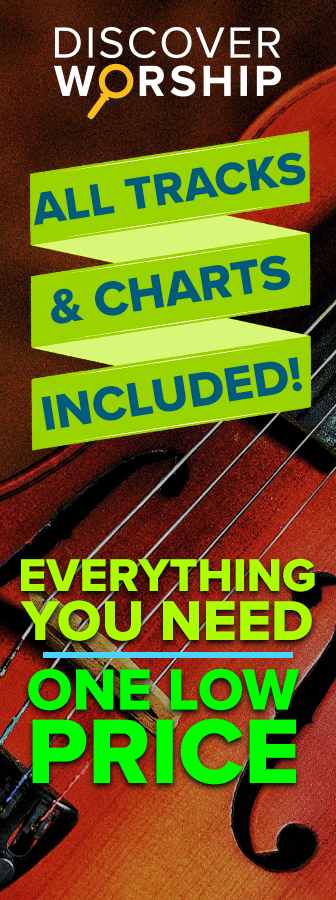Discover Worship: Robert, you're an interesting guy because a lot of arrangers I know either specialize in the choral space, or they’re in the artist-recorded space. But you've had a very successful career in both areas. You've won six Gospel Music Association Dove awards, you've had eight top 10 Christian radio hits, you've produced such artists as Point of Grace and the Talleys. And then you switched over to the left side of your brain and decided to write a book about the craft of Christian songwriting and have taught literally hundreds of people how to use their songwriting talents for God. So, we're ecstatic that you're here with us today. We have a number of your songs in our catalog and so, that makes it especially special for us. So let's start by telling us how you got involved in the music business and your journey through it.
Discover Worship: And where did you go to school?
Robert: I finished at Baylor in Waco, Texas. I started at North Texas State, which is a very big Music School – 2,000 music majors – and I transferred to Baylor and finished up there. At the time Waco, Texas, was the home of Word Music, and I began to get odd jobs. There were several of us. I happened to go to school with a group of guys and girls who ended up in the Christian music business. Dennis Worley was a classmate of mine who ended up being a big deal in music publishing and now is a music minister. Don Cason was a classmate of mine who ran Word publishing for 20 years and who signed me to Word Music. And Paul Smith, who ended up being one of the members of The Imperials and then had a solo career. We were all in a group together in college. Mark Hayes, who is a big deal choral arranger and composer, was the last roommate I had before I got married
So there was this feverish little group at Baylor that were all interested in the music business. We had a mentor, a guy named Charles F. Brown – everybody called him Charlie – who ran the publishing division of Word, and Kurt Kaiser who ran the entire music division at Word. They became my mentors, and under them, I learned about this Christian music business. Now, I didn't go into that immediately. I ended up leaving Waco. We had started our family there but went to Dallas where I wrote jingles for a decade. I wrote and produced jingles for radio and TV, and I was writing songs at that time. As a matter fact, I was living in Dallas, doing the jingle thing, when I got my first real cut – the Sandi Patti song “Sing To The Lord” around 1984. But I stayed in Dallas the entire decade of the 80s and the jingle thing kind of ran its course. That business changed dramatically thanks to technology and things like that, and I was getting very bored with it and didn't know what to do. My best friend, Chris Machen, an artist that I was working and writing with at that time, said, “Robert, everybody but you seems to know that you're supposed to be in Nashville.”
So, we made the move to Nashville in 1990, and that's when a lot of the choral work exploded. I had already begun arranging for choirs. Just here and there, you know, this publisher or that publisher would release a single piece or something like that. When I came to Nashville, Word signed me within a year, and I was signed to Word exclusively as a songwriter and arranger for 17 years, which is a long stay. Most guys rotate out after about 3 to 6 years, but it worked! It worked for Word, it worked for me. Until things changed dramatically in the business and at Word, where all the people that I knew and loved there had basically matriculated out of there to other things, it was a great relationship. I owe those folks a huge debt. It was a great 17 years of relatively stable employment for someone in this business, which is a very unusual thing.
Discover Worship: That was a real blessing!
Robert: Very much so. It was those crucial years when my sons were going through junior high, high school, college, and you know, the musician needed to pay for two college tuitions and two weddings and things like that, and it was a real blessing…it truly was.
Discover Worship: So when you sit down to write a song, let's say for the church, what do you keep in mind?
Robert: We could talk for hours about where an idea comes from. It can come from anywhere. But as I craft any song, I'm always thinking about who's going to sing it. I wrote a lot of songs for the late Luke Garrett, and when you're writing for Luke, you try to ask, “What would Luke sing?” When I wrote for Point of Grace, you say, “What would they sing?” So when you write for the church, you go, “What do they need to sing?” Then you also throw in limitations. For the church, there are musical limitations, that if you're smart – if you want something to be sung by a congregation – you keep in mind a congregation is a bunch of really average singers. So, don't write something that's got the range of "The Star-Spangled Banner." Write something that has a very tight range and that the average guy in the pew can sing. You know, I go, “What could my dad sing?” And you can hear me. I'm a bathroom baritone. You know, it's like I can't sing high. I don't write high notes when I want the average guy to be able to sing it. You think about things like that.
Also, you know Christian songwriters have got all the craft burdens and limitations that every songwriter has whether you write pop music or country music or theater music or whatever. But Christian songwriters have to concern themselves with theology. I was raised in a Southern Baptist house, and so I was at church on Wednesday night and Sunday morning and Sunday afternoon and Sunday night and all that. I had pretty good Bible teachers and preachers that helped me. I didn't realize it, but I had a pretty solid theological foundation. But, I've got a couple of pastor friends that I call my “theology rabbis.” Whenever I've got something in a song where I'm wondering “Am I a little off here and I am I stretching the biblical truth?” I'll run it past my friend Gene Wilkes, mainly, who's a head of a seminary in Dallas, and he'll look at it and go, “Yeah, this is good” or “You might want to think about that.”
Discover Worship: So it's not only about craft, but it's about truth.
Robert: Yeah, oh very much so. Sadly, I think there have been some songs that have slipped into the praise & worship field over the last 30 years that needed to have that check done on them, and it didn't happen. And we've had some songs in church that will go nameless with us here that have got some, I think, questionable theology. So it's important to me. I'm not saying I've gotten it right every time. I look back at older songs and I realize maybe I knew what I meant, what I thought I said; but maybe somebody reading or singing that or hearing it for the first time – hearing it a little more literally – might not understand. So I've probably put more limitations on myself in the last 20 years than I did in the early going of my writing career.
Discover Worship: Well, I think you're demonstrating care because we have a very precious message – THE most valuable message – in all of creation. So we should take great care in the way we present it.
Robert: Right, and you just want to present it truthfully and accurately. Now, that doesn't mean it has to be literal and without creativity. Songwriters are not preachers, and I think we can make a declarative statement, but we need to make it poetically. I think we also need to ask more questions in our songs and allow people to come to the answers the right way.
Discover Worship: The whole book of Job is one big question.
Robert: One big question – that's a troubling book.
Discover Worship: But that's what God wants us to do – to ask questions – and inevitably our quest will lead us to him.
Robert: Yeah, and I don't have a problem with asking God hard questions or asking hard questions of the Bible. “Why?” is a really important question. Because I figure if something is truth with a capital T – you know, the REAL truth – then questions won't bother it. The truth does not shy away from honest questions.
Discover Worship: Who was that preacher who once said that the truth of the Gospel doesn't need to be protected, it needs to be unleashed?
Robert: Oh, I don't know, but that's great. Yeah, I don't think it needs us to hide parts of it or anything like that. I’m comfortable with it.
Discover Worship: Well, let's talk about some of the projects that you've been affiliated with the that, looking back, you found the most pleasure or the most joy in. Maybe the ones that have been most successful. Just remind our listeners of some of them.
Robert: Well, the ones that were the most successful were not necessarily the easiest or the most fun. Ironically, the ones that were the most fun and the most joy were often the ones that were the least successful. That’s just an axiom for the music business in general. Things that are often the most popular and sell the most have been run through more wringers and squeezed and pasteurized more because you’re trying to reach a really large market. And so you're having to make a lot of people happy. The Point of Grace records – I produced the first two Point of Grace records which were both really successful – and the girls were sweethearts…I mean, they're lovely. But even they would tell you that both records were hard work for everybody involved because there was a new relationship with a record company, and none of them had ever done that before. They were working with me and with Scott Williamson on the first record, and they didn't know us, so everybody's kind of tentative. Management was coming in every day, and executive producers were hovering, and there was a lot of tension. I don't think any of that shows on the records. I think we got really great records, and it was a lot of hard work and a lot of tears, with four young women who were just barely out of college when we did that. And I wasn't always the most sensitive guy in the studio back then, and so that was a lot of work. I mean it's hard work.
On the flip side, possibly my most favorite record that I've ever produced was one with Kurt Kaiser. I did Kurt Kaiser's last album for Word, and it was delightful and quiet. It was called The Lost Art of Listening where he literally improvised 10 tracks at the piano right then and there in the studio, and then we went back in later and added ambient sound effects to them. We talked about what each one would be, and it's this terrific listening record that nobody's heard. Then the records I did with artists like Luke Garrett, who was arguably the most creative singer I've ever worked with. He never sang anything the same way twice. His theory was that whatever was captured on the record at that time was what he felt right then, and if you recorded it 30 minutes later, it would be something different. You never had to tell Luke what to sing. You just had to hope you captured it in the studio. His was a remarkable voice that had almost no technical limitations. Kind of like a Bob Carlisle but more inspirational…those really huge voices that come along from the church from time to time – Michael English and people like Steve Green – those guys that you just stand back and let them be them. Working with a guy like that was a real pleasure. But Luke never sold huge numbers of records.
Discover Worship: But he definitely had an impact.
Robert: Oh absolutely, and he had a real fan base in the church, and because of my background doing choral and everything, I think we made a good team for that.
Discover Worship: Name two or three of your big choral pieces…
Robert: Well, my most popular choral piece by far is an arrangement I did in 1985 –it's still selling – of “Jesus Paid It All.” Every time I go to a choral conference, I was just at one last week, I'll have at least two or three guys come up and say (and when I say guys I mean music ministers, male or female here) will come up and say, “Oh our choir loves that piece! We sing it at least once a year.” It has a real technical, impressionistic kind of piano part that church accompanists really enjoy playing. It's got a big dramatic arc to it. And of course, in that case the source material, the hymn itself, is so powerful, and the arranger’s best friend is good source material. When you've got great source material like that, I joke that a trained monkey could do an arrangement of it, and it would still be pretty good. It's hard to top a hymn like “Jesus Paid It All.”
The other one that a lot of people have sung is a song that I wrote with Chris Machen in the late 80s called “I Have Seen The Light” that had a slow start. It's a big Christmas song for a male trio with choir backup. And had a real slow start, and then somewhere in the early 90s, a choir director in Memphis at Bellevue (Jim Whitmire I think) put it in his Christmas program. And everybody heard it, and suddenly everybody was wanting to sing this song, and now a lot of men's groups have covered it because of this big trio thing. The Gatlin Brothers used it to close their Christmas concert for the last 20 years, and Gold City recorded it. A couple or three Southern Gospel groups have recorded it, and a group called Brethren, which is this men's group out of Washington DC has. It's been recorded probably 20 or 30 times by various men's groups and hundreds of times by choirs all over the country.
Discover Worship: That must give you a lot of satisfaction, too.
Robert: It was really cool. At least a decade ago I was in Branson for the closing of a show that I had written there, and the Gatlins had their Christmas show going across town. And their co-artists for their Christmas show were the Lennon Sisters.
Discover Worship: Wow! The Bing Crosby Lennon Sisters?
Robert: Exactly! The ones you used to see on Lawrence Welk and stuff like that, so anybody from my generation knew who the Lennon Sisters were. So we went to hear their concert, and they closed the concert with “I Have Seen The Light” – the Gatlins and the Lennons singing together. So, I got to hear two iconic american family vocal groups sing my song, AND what was CRAZY was the people around me were singing along because they knew the song. They probably had sung it in church. So, that was pretty neat.
CLICK HERE for part two of our exclusive interview with Robert Sterling.
--Check out these fine arrangements from Robert Sterling available from Discover Worship:
- And So We Sing
- At Your Feet
- Firm Foundation Medley
- Let Us Not Forget
- Love Alone
- My Dear Redeemer
- Purchased By Love w/Jesus Paid it All
- The Love of Christ
- What Wondrous Love Is This
--Robert Sterling is a Grammy-nominated songwriter, arranger, clinician, and record producer. In addition to garnering six Gospel Music Association Dove Awards and eight Top 10 Christian radio hits, Robert has produced albums by Point of Grace and the Talleys. He has written/arranged/orchestrated a small mountain of choral music anthems, collections, and musicals for Word Music, Belwin Mills, Shawnee Press, and LifeWay Music (among others). A 1977 cum laude graduate of Baylor University's School of Music, Robert and his wife have recently relocated to Waco, TX. His practical treatise, The Craft of Christian Songwriting, is available at Amazon.com. Check out robertsterlingmusic.com for helpful blogs, new choral arrangements, and information about how Robert can compose a special piece for your congregation. Discover Worship also offers several Robert Sterling arrangements including SATB Medium and Easy difficulty arrangements, as well as a two acoustic worship arrangements.





